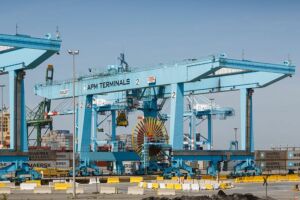News
APM Terminals investing billions into African port
This article is more than 10 years old.
New port in Bagadry, Nigeria to be its largest investment ever

AMP Terminals see much potential in Africa (photo: CEphoto, Uwe Aranas)
The Maersk-owned company APM Terminals has revealed it is investing about 14 billion kroner into a new port in Bagadry, Nigeria, in what will be its biggest ever investment.
The port will become the second-largest port in Africa – only surpassed by Port Said in Egypt – and is a clear signal that the Danish shipping giant’s terminal operator sees the African continent as a long-term hotbed for economic growth.
“We are currently purchasing property from the state and will start construction later this year. The port is scheduled to be completed in 2019,” David Skov, the managing director for APM Terminals in Nigeria, told Børsen business newspaper.
“Globally, it will be APM Terminal’s largest ever investment and marks a strategic shift to multi ports. It means we will supplement our own experience in container ports with the establishment of a free zone, an oil port and a bulk port, so in other words a complete port.”
READ MORE: Maersk terminal operator plotting a new course or two
Poor infrastructure
APM Terminals also operates two other ports in Nigeria, Apapa and in Onne, but operations in Nigeria are hampered by constant traffic congestion, piles of rubbish and a general lack of effective infrastructure.
The short 40 km trip from Bagadry to Lagos can take anything from 45 minutes to four hours, depending on traffic.
It’s not APM Terminal’s first forage into Africa and the port operators revealed late last year that it was planning a major investment in Ghana’s largest port, Tema Port.










































